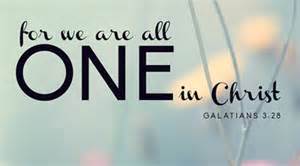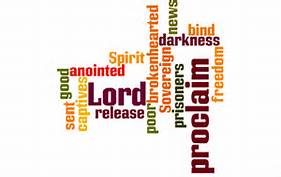“Unity of Christ’s Church”

Galatians 3:26-29 – August 28, 2016
One of my sisters lives in the New York City area, on Long Island. She has lived there for more than twenty-five years. She is a wonderful, generous hostess, and often takes her family and friends to various places around New York, site-seeing. We love to visit my sister. When my children were younger, we went with my sister to the top of the Statue of Liberty—on two different occasions!
The Statue of Liberty. A beacon of light for generations. When my grandfather was a boy in the early 1900’s, he and his family emigrated to the United States from a shtetl in western Ukraine. He remembered standing on the deck of a steam ship from Europe, coming into New York harbor. He gazed over the rail at the welcoming sight, along with everyone else on that ship. The Statue of Liberty was etched vividly into his memory. I know, because he told me so.
This country has been called a melting pot, containing different nationalities, cultures, and ethnicities. Some call this country a mosaic or a kaleidoscope of people. Whatever you call it, the United States is truly an amazing nation made up of a multitude of individuals (or, their ancestors) who came from all over the world.
Unity. Unity amidst diversity. That is what this country is all about.
Let’s take a second look at our Scripture passage for today from Galatians 3. The Apostle Paul writes to the believers in the region (or area) called Galatia in Asia Minor. He makes an all-important point at the end of chapter 3: our text for today. “26 So in Christ Jesus you are all children of God through faith, 27 for all of you who were baptized into Christ have clothed yourselves with Christ. 28 There is neither Jew nor Gentile, neither slave nor free, nor is there male and female, for you are all one in Christ Jesus.”
I think you all might suspect what the theme for today’s service is. Unity!
Just as our nation incorporates strong unity amidst wonderful diversity, so does the Church. Not only this congregation, this fellowship of believers, but I am talking about the Church Universal. The Church around the world.
Taking a closer look at verse 3:28, at first glance, we might focus on the differences. Wow! There are some pretty big differences here. Paul mentions some significant separations and divisions. Different categories. What does this diversity look like?
First, “there is no longer Jew nor Gentile.” That is a serious thing for the Apostle Paul to say. Before his conversion on the road to Damascus, Paul was a Hebrew of the Hebrews; a member of the Sanhedrin (that is, the ruling religious council of Jerusalem). A top-notch Pharisee who probably prided himself on his meticulous keeping of the Mosaic Law code, down to the smallest detail. Good, law-keeping, observant Jews of that time would not allow themselves to associate with, or even talk to a Gentile. So—after he became a Christian, we can see how serious Paul was about this unity of everyone, in Christ Jesus.
The second difference? “There is neither slave nor free.” Jesus Christ takes away all distinctions of social class and standing!
Wait a minute! That is not strictly true. In this troubled world, there are lots of differences, lots of separations in social hierarchy. In Morton Grove, we see many people who are solidly middle class. Different from wealthy people living on the Gold Coast, just off Michigan Avenue near the Water Tower. Go just a few miles further south, to the Englewood area of Chicago. I saw some of areas of extreme poverty when I visited there, earlier this month.
However, when people come to believe in Jesus Christ, social class and power can be dissolved, and go away. The unity of all believers is emphasized in this verse, again.
The third difference we notice? Paul mentions “nor is there male and female.”
Subtle difference! Yes, God created people male and female. Yet, when people come to faith in Christ Jesus, there is a new creation. All things are become new, as Paul tells us in 2 Corinthians 5. Even gender is given a back seat. Each person’s belief in Christ is emphasized in this new creation, differences are dissolved, and the unity of all believers is lifted up. We are all one big family.
Earlier in this letter, Paul mentions circumcision. That’s something that is very Jewish. And, very male. In the time before the common era, women and girls could not be considered full children of Abraham because they could not be circumcised. (For obvious reasons.) That was fully half of all religious people who could not fully participate in religious functions. Yet now, in this new creation in Christ Jesus, the old differences and distinctions no longer separate male and female. All things have become new.
Let me remind everyone of how earthshaking this all must have been for the Apostle Paul. Talk about having his entire worldview and frame of reference turned upside down! A good, observant Jew who studied with one of the leading rabbis of that day, now associating and eating with Gentiles. Staying in their homes. What a huge change of Paul’s way of thinking.
One big theme of the letter to the Galatians is that of identity. Who are we? What are our identity markers? How do we tell who others are, in our group? Paul says so, right here. Those who are baptized in Christ are children of God. Everyone who is baptized is our brother, our sister. That’s a whole lot of people, when we consider all the people who are believers, not only in the United States, but in the whole world!
I don’t know how many of you remember your own baptism, as infants and children. However, Paul is talking to people who were baptized as adults. The weeks beforehand must have been significant, too, in which these new believers were fully instructed and immersed in the understanding of Christ as their Messiah, their Lord and Savior. Then, often on Easter Sunday, the new believers were baptized. When possible, they were fully immersed, or at least had water poured over them in a large tub. Sometimes, naked, because they often would remove their clothing before the ceremony. After the baptism, they put on a new, white garment, signifying their new life in Christ. They were truly “clothed in Christ,” just as Paul says here.
As diverse and different as we are, considering world-wide Christianity, we all have become one humongous family of God. We are all God’s children.
How many of us, today, can say that? Yes, when babies and children are baptized today, we make a big fuss. We buy them special outfits for the occasion. But, do we truly take the new reality—this new identity—to heart? We have all been transformed, through Christ.
What a transformation! What an identity shift. We here at St. Luke’s Church are just as much God’s children as the Catholics worshipping at St. Martha’s Catholic Church south of Dempster. And, both groups of believers are just as much God’s children as those baptized at St. Haralambos Greek Orthodox Church on Caldwell. And, what about our friends at Love Sharing Disciple Church here, who will be worshipping in this sanctuary later today? This is duplicated at churches and auditoriums all over the Chicago area, with diverse ethnic and cultural groups of believers. We can enlarge that to a wide variation of church practices, all over the world. Wow! Double wow!
What a mosaic of identity in Christ. What a kaleidoscope of difference, made one huge family of God. Remember our sentence for the week, from the United Church of Christ Statement of Mission? “Empowered by the Holy Spirit, we are called to embrace the unity of Christ’s church.”
The unity of Christ’s church, in such beautiful, rich, worldwide diversity. This is truly something to celebrate! Alleluia, amen.
[Thanks to Dr. Richard B. Hays for concepts and ideas from his commentary on Galatians 3, from The New Interpreter’s Bible Commentary (Nashville, TN: Abingdon Press, 1996).]
(Suggestion: visit me at my regular blog for 2016: matterofprayer: A Year of Everyday Prayers. #PursuePEACE – and my other blog, A Year of Being Kind . Thanks!)




